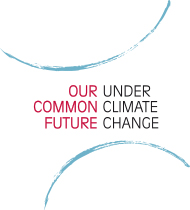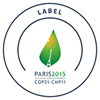The bioeconomy, in a shared meaning, in particular at European level, is an economy based on the use of renewable carbon from agricultural or forestry biomass and organic wastes for producing food, fibers, bio-based chemicals, bio energies... The renewable feature of the biomass is one of its most distinctive characteristic compared to fossil resources.
In terms of carbon management, bioeconomy is inscribed in a carbon cycle based upon the plant capacity to assimilate CO2 via the photosynthesis. The neutrality of carbon footprint (CO2 absorbed versus CO2 emitted) depends on the quantity of fossil carbon used along the production cycle and the value-chains in terms of fossil-based´┐Ż intermediate consumption (fertilizers, energy, ´┐Ż) and on the capacity of carbon storage, particularly in the soils.
The aim of this conference is to evaluate the potential contribution of the bioeconomy, regarding the mitigation of climate change by reducing fossil carbon emissions while increasing the anthropic use of renewable carbon and the capture and sequestration of carbon.
What are the conditions allowing the bioeconomy to be virtuous for the climate? What are the limitations for its development regarding ´┐Żlimiting factors´┐Ż like competition and complementarity for uses? How to assess the sustainability ?
Two angles of discussion will be proposed: the first one at the scale of the planet because the issue is global and frontierless; the second one at regional scale where biorefineries ´┐Ż considered as the cornerstone of the bioeconomy ´┐Ż should be set up.
The French competitiveness cluster IAR (Industries &Agroressources;) which promotes the development of this type of territorial biorefineries has got a certain knowledge in this particular topic and will share its practical experience of local integration. Actually, the possibilities for ´┐Żclosing the loops´┐Ż are numerous and particularly by recycling in the fields, some by-products and effluents. An ecosystemic approach, based on the industrial ecology principle, will be discussed.
This conference is proposed by the ´┐ŻFondation Jacques de Bohan´┐Ż, a think tank dedicated to the bioeconomy, carried by 2 agricultural cooperatives, Vivescia and Cristal Union with the support of INRA. Several other stakeholders, associated to the foundation and/or to the cluster IAR will be involved in this event. Together, we will support a cooperative and collaborative approach.
Based on the 2 approaches mentioned, 2 round-tables will be held, the first one for discussing the global / international issues and their effects and the second one for discussing the local implementations through practical experiences. An opening conference, given by a representative from INRA will set the scene.
Taking into account the quality and the diversity of the speakers, we should expect to ´┐Żhigh level´┐Ż discussionsandto the publication of a position paperfor upcoming discussions during COP 21.
At last, we cannot reduce the bioeconomy to the circular economy (same for the opposite), but the bioeconomy is a circular economy ´┐Ż ´┐Żby nature´┐Ż (in essence) !
Our common ambition is to show it!



